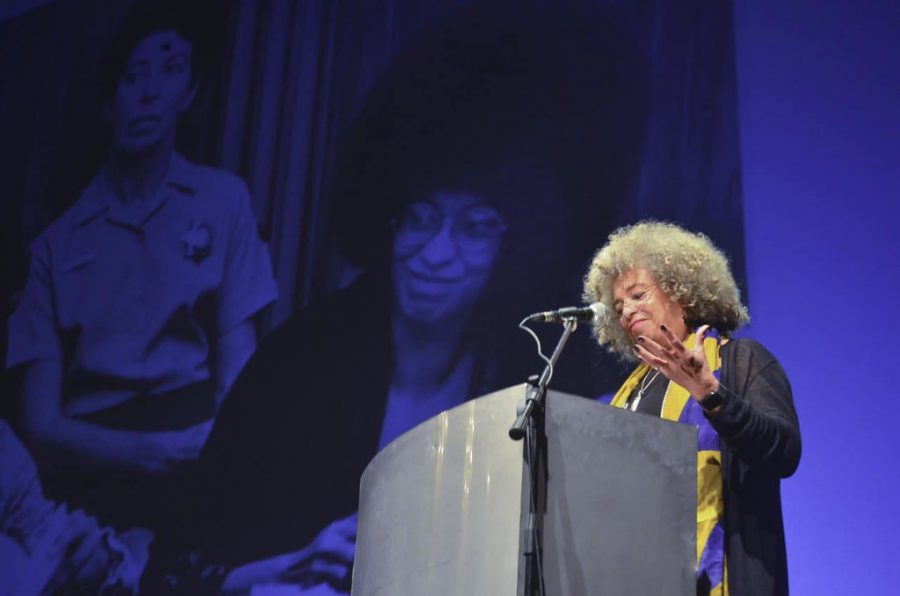Angela Davis discusses how students can work toward a liberated future
“Angela Davis en Montevideo” by MediaReduy is licensed under CC BY-SA 2.0.
Davis spoke to the Northeastern community Feb. 15 about racial capitalism, education, abolition movements and the role of music in liberation movements.
February 19, 2021
Most students nationwide have only seen the name “Angela Davis” in their class readings and history textbooks. Northeastern students, however, had a chance to meet the abolitionist Feb. 15, when she joined them in a conversation about racial capitalism, education, abolition movements and the role of music in liberation movements. The event was led by Students Advancing Intersectional Dreams, or SAID, with other student organizations co-sponsoring.
Former SAID Director Charles T. Wallace-Thomas IV, a fourth-year economics and mathematics major, moderated the conversation.
Davis first addressed Wallace-Thomas’ question about the dual and contradicting role of higher education in the fight for liberation. Davis said higher education can provide tools needed to fight injustices, while also serving and perpetuating structural inequalities.
“The major purpose of education [is not only to learn] how to approach the text we read, but also how to approach the conditions under which we live,” Davis said.
The best education a student can acquire, she said, occurs through the realization that the “university is not the only venue for the production of knowledge.” She added that one of the most important skills a student learns is how to critically examine ideas that are “in tension” with each other.
Highlighting the stark contrast between the violent response to Black Lives Matter protests and rioters who stormed the United States Capitol Jan. 6, Gabrielle Hernandez, a second-year biochemistry major, asked Davis about the racism seen in the comparison between the protests and its contradiction to freedom of expression.
In response, Davis referred to the ideologies of freedom and equality that have shaped the founding of the United States. She reiterated the importance of “be[ing] able to hold things in tension.”
To hold ideas “in tension” involves identifying ideologies that may be “productive and positive,” such as freedom, with the realities that are contradictory to them and detrimental, such as slavery.
Davis related these contradictions to the desire of the United States to dominate the rest of the world.
“The [idea that] the United States of America is the most important embodiment of collective freedom in the world … Well, at least half the country recognizes that [this idea] is a serious misapprehension,” Davis said.
Davis also explained racial capitalism, a term coined by Cedric Robinson in his book “Black Marxism.”
“Capitalism itself was born of colonialism and slavery,” she said.
Eri Lee, a third-year sociology student and co-coordinator for SAID’s organizing committee, was “awe-struck” by Davis. Lee said she was very proud of the student groups that organized the event. Particularly, she praised Wallace-Thomas for being an “incredible” moderator and being “on the same wavelength as [Davis].”
“What was most interesting and captivating for me was [Wallace-Thomas and Davis’] conversation about jazz and music like the music of revolution,” Lee said.
Davis saw music as a tool for furthering political action.
“[Music] allows us to feel what we haven’t yet figured out how to say in our ordinary language,” she said. “Black music has always been the music of freedom … [Jazz’s] improvisational nature teaches us that we have to do the experimentation and imagination and all the cultural work that is necessary to push us forward.”
Wallace-Thomas said the conversation provided critical information for students looking to create change on campus. He said that the theory-based discussion “dropped bread crumbs that we can follow on the way towards our own paths to fighting for a liberated future.”
Wallace-Thomas said the practicality of Davis’ teachings reckoned with his experience entering college as an aspiring engineer hoping to secure a stable financial future.
“The engineering curriculum and the experiences available to me within engineering co-ops weren’t necessarily giving me the tools, the social analysis, that I needed,” he said. “If we’re not addressing the fundamental reasons why the world exists [the] way that it does, and we’re trying to create solutions that are almost Band-Aids, we’re not going to fundamentally solve anything.”
For Davis, the fundamental problem that caused our structural inequities today is capitalism. She said she was glad that racial capitalism has finally gained momentum in recent years, crediting Robinson for his decades of advocacy.
“As scholars, activists, advocates, artists [and] community people, we’re finally begining to recognize that the task confronting us is one that should have begun to unfold in the aftermath of slavery … We’re 150 years too late, but we’re still doing the work,” Davis said.






